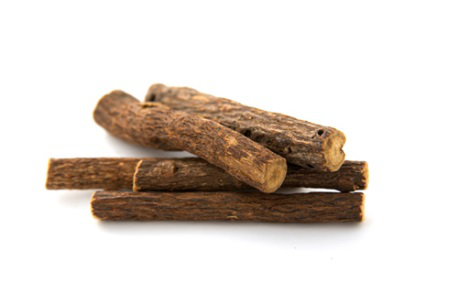Description
Botanical: Glycyrrhiza glabra
Other common names: The Great Harmonizer, Gan Cao, Sweet Wood, Grandfather Herb, Liquorice, Sweet Licorice.
Delicious Licorice will help to keep your lungs clear, your digestive tract calm, your colon cleansed andyour adrenal gland functioning properly. Alexander the Great is said to have given his soldiers Licorice to boost their energy before a battle, so why not try some if you are feeling exhausted and stressed? Licorice is a reliable and pleasant way to soothe a sore throat.
Country of origin: Turkey
Beneficial Uses:
Licorice has been used for thousands of years as a superior expectorant that is primarily used as an herbal remedy for respiratory problems. The herb helps loosen phlegm and ease non-productive coughs. It is also very helpful for bronchitis, congestion and colds. As a demulcent, Licorice soothes mucous membranes and helps relieve sore throats. It is a time-honored and wonderfully effective ingredient in cough medicines and cough drops as both a pleasant flavoring, as well as an expectorant and soothing agent.
Considered an herbal anti-inflammatory, the glycyrrhizic acid activity in Licorice seems related to the way corticoids are released from the adrenal glands, which is helpful in treating arthritis, rheumatism and stiff, painful joints. The herb stimulates production of cortisone and aldosterone, which appear to be effective anti-inflammatory agents.
Licorice is a wonderful support for good digestion and healthy gastrointestinal system. As a demulcent, the herb soothes the mucous membranes and protects the stomach and intestines. It has been known to coat and protect the stomach's lining with a mucus, rather than restraining the secretion of gastric acid (which would result in incomplete digestion) and reduce the activity of pepsin. Glycyrrhizinic acid also helps to inhibit enzymes that dismantle prostaglandins, which will help the stomach and upper intestine, allowing ulcers to heal more quickly. This activity may also protect the colon and treat ulcerative colitis, Crohn's disease, Celiac disease, gastritis and peptic ulcer.
As an effective antibacterial, the glycyrrhizinic acid in Licorice seems to stop the growth of many bacteria and is a further support for the respiratory tract by treating infection. The Chinese utilize Licorice as a powerful antitoxin and use it for the treatment of pesticide poisoning. It may also curb malaria.
Regarded a s an herbal antiviral, Licorice combats viruses, including influenza-A, hepatitis-B, Epstein-Barr virus (chronic fatigue) and holds promise for the treatment of HIV. Studies have shown Licorice to be effective in treating viral hepatitis, particularly chronic active hepatitis (under a doctor's care), due to its well-documented antiviral activity.
Licorice is an age-old, mild laxative that is also known to cleanse the colon. It is considered an "alterative," which is an herb that gradually converts an unhealthy condition into a healthy state and facilitates a beneficial change in the body. Alteratives often achieve favorable results by cleansing and stimulating the efficient removal of waste products from the body, and Licorice is said to be a cleansing stimulant that is effective for removing toxins and wastes. It is also thought to be good for bladder and kidney ailments (under a physician's care).
Modern herbalists commonly use Licorice to sustain adrenal function and treat adrenal insufficiencies, including hypoglycemia and Addison's disease. It is also used to purify the liver, the body's detoxification center, helping its defenses against liver diseases, such as cirrhosis and hepatitis, but again this application must always be conducted under your doctor's guidance.
Licorice is sometimes called an adrenal-hormonal that is said to stimulate the production of interferon, the agent thought to be key in inhibiting and managing immune-response deficiency diseases. The herb contains a natural hormone that induces the adrenal cortex to produce larger amounts of cortisone and aldosterone and assists the body to handle stress and relieve exhaustion.
Licorice is believed to produce mild estrogenic effects and is said to help normalize ovulation in women experiencing infrequent menstruation and also ease menopausal symptoms.
The active ingredient, glycyrrhizic acid, is known to be fifty-times sweeter than sugar cane, but it does not promote thirst; it actually will alleviate thirst.
Licorice helps to regulate low blood sugar. The glycyrrhizin content has a chemical structure similar that of human steroid hormones, which appear to help raise blood sugar levels to normal.
Contraindications:
Pregnant women, diabetics and those with high blood pressure should avoid this herb. People suffering from heart disease should not use Licorice unless under a physician's care. According to the German Commission E monograph, Licorice supplements are contraindicated in people with liver and kidney disorders, and thus, people with kidney disease, gallbladder disease and cirrhosis should avoid this herb. Large doses of Licorice may induce sodium retention and potassium depletion and can lead to hypertension and edema. Use of Licorice should be done under the supervision of a health care provider or qualified practitioner. The herb is not meant for long term use and should not be taken for more than seven days in a row. Long-term intake of products containing more than one gram of glycyrrhizin (the amount in approximately ten grams of root, which is far in excess of the daily dosage recommended by this product) is the usual amount required to cause these types of effects.
Do not take Licorice without speaking with your physician if you take potassium, laxatives, the heart medication, Digoxin (Lanoxicaps®, Lanoxin®, Lanoxin Pediatric®) or prescription diuretics (which may lead to loss of potassium, which may cause fatigue, muscle cramps, headaches, swelling, increase urination, breathlessness or high blood pressure). Other possible drug interactions with any Licorice product include potentiation of anticoagulants and possible interference with hormonal therapy due to estrogenic activity of Licorice (including decreased testosterone and birth control pills).


